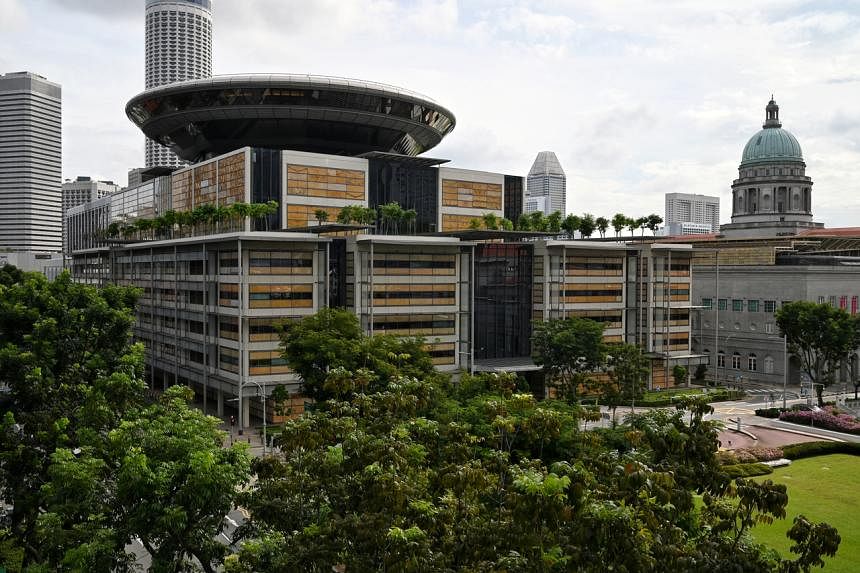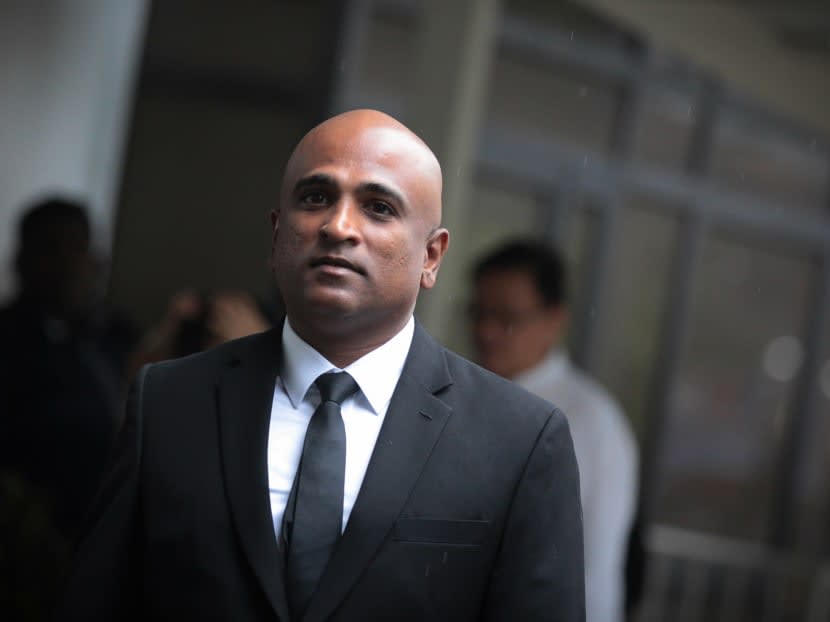RIGHT TO A FAIR TRIAL - Laws that allow the Court, in Criminal Trials, to order the accused person to pay prosecution cost to the Public Prosecutor(or Attorney General's Chambers) is UNJUST and a violation of one's right to a fair trial. Would it not DETER the accused from making all needed applications to court to prove his innocence - such laws should never even exist, and accused persons should be FREE to make all needed applications. Courts will decide. Accussed belief, or his lawyer's belief of whether a new evidence or a new legal arguement will move the court to vary their decision is irrelevant - for ultimately it is Courts that decide in a criminal trial.
Remember the courts and the prosecution are fully funded by government's monies - compared to the suspect or accused, who bears his/her own cost to defend himself/herself and will have to pay their lawyers fees, the court filing charges, and even the cost of needed witnesses. The cost to get an expert witness is HIGH - like getting a doctor to do the needed test to determine the mental/intellectual capacity and then coming to court to testify and submit his expert opinion is all very high[That cost itself could be from RM20k to RM50k or more, and all the cost is paid by the accused persons]. If the accused is super rich, then not a problem but the reality is that many accused/suspects are POOR.
The State appreciate the unfairness - and, in some countries, have responded by the provision of Legal Aid schemes. In Malaysia, for a long time, the government did not provide Legal Aid for suspects/accused in criminal trials - and the Malaysian Bar stepped in to provide Legal Aid. Of late, the Malaysian government has joined in to provide legal aid to accussed/suspects in criminal matters. But still, the government is unwilling to provide legal aid to non-Malaysians.
In Legal Aid schemes, the suspect/accused may not have to pay legal fees to their lawyers - but most legal aid schemes may not bear the additional cost of calling expert witnesses - the suspect/accused have to pay for it.
With legal aid, the right to be represented by lawyer of your choice is affected > your choice may be limited to lawyers in the legal aid scheme, or you may be 'forced' to accept the lawyer assigned by the Legal Aid Programme.
Thankfully, there are many lawyers, who may not be paid by Legal Aid Schemes, that do come in on their own to represent the accused/suspect in criminal trials. These lawyers may charge a minimal fee, or may not charge any fees at all - so they spend their own time and resources to ensure that a suspect/accused gets his right to a fair trial.
Hence, in criminal trials - the suspect/accused should never be burdened by the RISK that he/she may be ordered by court to pay the cost of the Prosecution.
More importantly, lawyers who act for clients in criminal trials should never be at RISK of personally having to pay cost of prosecution in Criminal Trials.
Hence, such law and practice of ordering accused/suspects and/or their lawyers to pay cost of prosecution if the fail in any applications made in court should be abolished - REPEALED.
The possibility of lawyers having to pay cost/damages personally for things done as lawyers for a client is ABSURD. A lawyer can only do as instructed by client - he cannot do things if the client does not tell him to do, or agree that any application be filed.
LAWYERS must be protected from risks, threats and harassment for things done in court processes as the the client's lawyer.
The very existence of laws that can be used against lawyers personally for things done in court in the defence of his/her client ought to be abolished - more so, court orders that the lawyer personally pays for the cost of prosecution and/or other court costs. ir
A lawyer at risk, as above, may not be able to act as best as he could for his/her client worrying about possible repercussions against him/her personally.
Hence, the requirement of a fair trial, which must include the right to a lawyer of one's choice, where the lawyer is at personal risk may lead to an accused not getting his FAIR TRIAL. That 'personal risk', in this case possible future orders that the lawyer personally may have to pay the prosecutor or AGC cost of prosecution(or court costs) must be removed to better ensure the full enjoyment of the Right To a Fair Trial.
It is shocking that the Public Prosecutor(or the Attorney General's Chambers) was the one in this case asking for the lawyer to pay personally costs ...
Note that if the Public Prosecutor is ordered to pay cost, that monies does not come out his/her pocket but from State funds. When a lawyer is asked to pay cost, it comes out of his/her pocket....
 |
| Violet Netto and M Ravi |
Lawyers for Malaysian drug trafficker ordered to pay $20,000 for incurring unnecessary costs

SINGAPORE - The two lawyers who acted for Malaysian drug trafficker Nagaenthran K. Dharmalingam in a last-ditch attempt to halt his execution were on Wednesday (May 25) ordered to pay $20,000 in costs to the Attorney-General's Chambers (AGC).
Mr M. Ravi, who did most of the work, was ordered by the Court of Appeal to bear 75 per cent of the costs, while Ms Violet Netto, who later took over as the lawyer on record, was held liable for 25 per cent.
The AGC had originally sought personal costs totalling $40,000 against Mr Ravi and Ms Netto for setting out to delay Nagaenthran's execution by filing unmeritorious applications, which caused it to incur unnecessary costs.
Under the law, the court has the power to order personal costs against a lawyer who causes the incurring of unnecessary costs by acting improperly, unreasonably or negligently.
On Wednesday, a five-judge Court of Appeal, led by Chief Justice Sundaresh Menon, said it would be apparent to any reasonable defence counsel that the case advanced by the duo lacked factual basis.
The court reiterated that the way the case had been conducted was a blatant and egregious abuse of the court process.
Instead of putting their best case forward at the first instance, the lawyers "drip fed" the supposed evidence and tendered documents at the last possible moment, said the court.
The court also rejected Mr Ravi's argument that he and Ms Netto cannot be made to pay personal costs as they are no longer practising lawyers.
Nagaenthran was convicted of trafficking 42.72g of heroin in 2010 and given the mandatory death penalty. His appeals against his conviction and sentence were dismissed in 2011.
Over the years, Nagaenthran filed a total of seven applications to challenge his death sentence.
Days before he was scheduled to be hanged on Nov 10 last year, Mr Ravi filed an applicaton seeking judicial review of the impending execution.
Mr Ravi also filed another application, asking for a stay of execution for Nagaenthran to be assessed by a panel of psychiatrists.
The main argument was that the death sentence could not be carried out because Nagaenthran was mentally disabled.
The case was argued by Ms Netto, assisted by Mr Ravi, before the apex court on March 1.
On March 29, the court dismissed the legal actions, saying that the case was baseless and that there was no admissible evidence of any decline in Nagaenthran's mental condition.
The court said the proceedings brought by Nagaenthran amounted to an abuse of the court's processes and had been conducted with seeming aim of delaying his execution.
On April 26, a last-minute application by Nagaenthran's mother to halt his rescheduled execution was dismissed by the court.
He was hanged at Changi Prison Complex on April 27. - Straits Times, 25/5/2022
High Court dismisses misconduct charge against lawyer M Ravi over comments about death penalty case

- Lawyer M Ravi spoke in an interview after a Court of Appeal decision about his client who was then on death row
- AGC filed a disciplinary complaint to LawSoc
- It took issue with the lawyer’s comments during the interview about an "overzealous" prosecution for the death row case
- After a disciplinary tribunal formed by LawSoc said those were fair comments, AGC applied to the court for a review of the decision
- High Court judge See Kee Oon dismissed AGC’s application, but Mr Ravi still faces one misconduct charge
SINGAPORE — A High Court judge on Thursday (May 12) dismissed a request by the Attorney-General (AG) to review a disciplinary tribunal’s decision where lawyer M Ravi was found to have made fair criticism, thus ruling that he did not act with malice over a death row case.
The case was tied to Mr Ravi’s client Gobi Avedian, a 32-year-old Malaysian drug courier.
Gobi escaped the gallows in October 2020 after the Court of Appeal reviewed his earlier death penalty sentence and reinstated his original High Court sentence of 15 years’ jail and 10 strokes of the cane.
After this, Mr Ravi gave a video interview that was posted on the Facebook page of the now-defunct socio-political news site The Online Citizen.
In the interview, Mr Ravi said: “The prosecution, in prosecuting people especially for (the) death penalty — it is extremely important that you must be fair to both sides, the accused and the state.
“So therefore, balancing this, the state has been overzealous in its prosecution, the Public Prosecutor has been overzealous in this prosecution and that has led to the death sentence of Gobi.”
Mr Ravi also said it was “troubling” that the prosecution ran a different case before the High Court and Court of Appeal, and that the apex court had called the fairness of the prosecution into question.
The Attorney-General’s Chambers (AGC) then said that his claims were “categorically false”. It also issued the lawyer a letter demanding that he apologise and retract his allegations.
The AG serves as the Public Prosecutor.
When Mr Ravi refused to do so and demanded an apology from state prosecutors, AGC filed a disciplinary complaint against him to the Law Society of Singapore (LawSoc).
AGC said that Mr Ravi had “made serious allegations insinuating that the Public Prosecutor had acted in bad faith or maliciously... and that this alleged misconduct led to the imposition of the death sentence on (Gobi)”.
A disciplinary tribunal convened by LawSoc found that Mr Ravi’s statements constituted fair criticism, given that he had a rational basis for saying what he did.
This was because the Court of Appeal had observed that the prosecution advanced a different case against Gobi during the High Court trial, as compared to what was put forward on appeal, and expressed its concern that this had ultimately prejudiced Gobi.
The tribunal did not make out a professional misconduct charge arising from AGC's complaint.
The AG then filed an application to the High Court to review the tribunal's decision.
The AG argued that Mr Ravi's use of the word “overzealous” could carry the insinuation that the prosecution was overly enthusiastic or too eager to secure Gobi's conviction on a capital charge.
WHAT JUDGE SAYS
On Thursday, High Court judge See Kee Oon considered whether Mr Ravi had implied that the prosecution acted with malice, in bad faith or improperly. TODAY had obtained a copy of his oral remarks.
The judge found that the lawyer’s statements, “taken as a whole and understood in context”, did not imply that the prosecution had sought to achieve this at all cost or through any means.
What Mr Ravi said was premised on the rational basis that the prosecution’s approach during Gobi’s appeal had prejudiced him, which meant that Mr Ravi did not intend to impute malice, bad faith or impropriety to AGC, Justice See said.
"It does not equate to a suggestion that the prosecution had acted improperly in its conduct of Gobi’s case on appeal when it changed its case,” he added.
Justice See also saw no issue with Mr Ravi’s use of the word “troubling” because there was some factual basis to this sentiment.
Justice See noted that that the context of Mr Ravi’s remarks was also relevant in determining how an ordinary, reasonable person would understand them when they were made, as well as what Mr Ravi intended.
The judge said that in his view, the relevant context was the full transcript of Mr Ravi’s interview alongside the Court of Appeal’s oral judgement on Gobi’s case.
He rejected the AG’s submissions that the disciplinary tribunal had failed to consider what happened in the days after the interview.
This included the AG’s letter to Mr Ravi; the lawyer’s Facebook post that stated that the “government lawyers” who “handled Gobi’s case are the wrongdoers”; and Mr Ravi’s response letter where he refused to apologise.
Justice See said: “Even if the evidence of subsequent statements or events in the days after may be said to shed some light on (Mr Ravi)’s intent at the time of making the statements, such evidence would only serve as a form of secondary (and weak) corroboration at best.”
The judge also agreed with the disciplinary tribunal that Mr Ravi’s statements constituted fair criticism. Pertinently, the Court of Appeal had accepted that the prosecution’s failure to run a consistent case at trial and on appeal was unfair to Gobi.
However, the apex court acknowledged that during the High Court trial, a judgement regarding the issue of wilful blindness in drug trafficking cases had not been released.
In Gobi's case, the Court of Appeal had found that the prosecution failed to prove he was “wilfully blind” to the nature of the drugs — 40.22g of heroin that were found on him at Woodlands Checkpoint in 2014.
Thursday’s development does not spell the end of Mr Ravi’s
disciplinary issues. LawSoc's tribunal has made out a misconduct charge
in relation to the Facebook post he had published alleging that
“government lawyers” who “handled Gobi’s case are the wrongdoers”. - Today, 12/5/2022
Criminal Procedure Code 2010
| COMPENSATION AND COSTS |
| Order for payment of costs by accused and order for payment of costs incurred by accused in accused’s defence |
| 355.—(1) The
court before which a person is convicted of an offence may, in its
discretion and if satisfied that the defence of the person was conducted
in an extravagant and unnecessary manner, make an order for costs, of
an amount fixed by the court, to be paid by the person to any other
party to the proceedings in which the person is convicted of the
offence. [19/2018]
|
| Costs ordered by Court of Appeal or General Division of High Court |
356.—(1) The Court of Appeal or the General Division of the High Court, in the exercise of its powers under Part 20, may —
|
| Costs against defence counsel |
357.—(1) Where
it appears to a court that costs have been incurred unreasonably or
improperly in any proceedings (for example, by commencing, continuing or
conducting a matter the commencement, continuation or conduct of which
is an abuse of the process of the Court) or have been wasted by a
failure to conduct proceedings with reasonable competence and
expedition, the court may make against any advocate whom it considers
responsible (whether personally or through an employee or agent) an
order —
|
| Costs awarded against Public Prosecutor |
358.—(1) Costs
awarded against the Public Prosecutor are to be paid out of the
Consolidated Fund and costs awarded to and received by the Public
Prosecutor are to be paid into the Consolidated Fund.
|
| Order for payment of compensation |
| (a) | the offence or offences for which the sentence is passed; and |
| (b) | any offence that has been taken into consideration for the purposes of sentencing only. |
| (2) If the court is of the view that it is appropriate to make such an order mentioned in subsection (1), it must do so. |
| (3) If an accused is acquitted of any charge for any offence, and if it is proved to the satisfaction of the court that the prosecution was frivolous or vexatious, the court may order the prosecution or the complainant or the person on whose information the prosecution was instituted to pay as compensation to the accused a sum not exceeding $10,000. |
| (4) Any order for compensation made under subsection (1) does not affect any right to a civil remedy for the recovery of any property or for the recovery of damages beyond the amount of compensation paid under the order, but any claim by a person or the person’s representative for civil damages in respect of the same injury arising from the offence, is deemed to have been satisfied to the extent of the amount paid to the person under an order for compensation. |





No comments:
Post a Comment